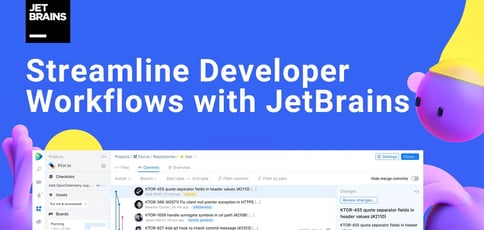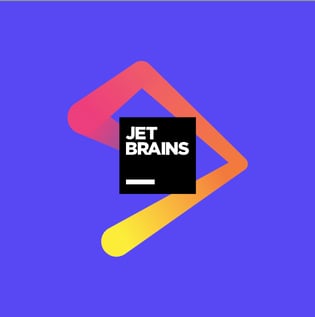
TL; DR: JetBrains is a Czech software vendor that specializes in time-saving tools for developers and project managers. The company, founded in 2000, speeds up workflows by automating routine tasks in coding, planning, and collaboration. JetBrains also simplifies integrations with multiple cloud hosting platforms, making for a smooth and practical DevOps experience.
Those with any connection to the tech industry have likely heard of eating your own dog food — developer slang for using one’s software product internally.
The concept may sound unappetizing, but it serves up some surprisingly palatable benefits. By testing their products in a real-world setting, developers can more accurately understand and improve the user experience. The practice also serves as a testimonial of product efficacy.

JetBrains is a developer-centric software vendor.
Hadi Hariri, Vice President of Developer Advocacy at JetBrains, told us that his company puts dogfooding at the heart of its development process.
“Our goal is to make development easier for our users,” Hadi told us. “About 60% of our employees are developers — so there’s heavy dogfooding going on here. It helps us make it easy for developers to be better at what they do.”
JetBrains uses the technique across a wide range of developer, team collaboration, and learning tools. Many are focused on eliminating repetitive tasks through the power of automation.
To ensure a stress-free DevOps experience, the company also facilitates easy integrations with multiple cloud hosting platforms.
In addition to its software solutions, JetBrains offers its own developer-focused multiplatform programming language, Kotlin. As a suite, these tools help developers streamline their workflows to the tune of greater productivity and faster time to market.
Launched on a Mission to Facilitate Code Refactoring
JetBrains was established in 2000 by Co-Founders Sergey Dmitriev, Valentin Kipyatkov, and Eugene Belyaev. The trio of Java developers saw that there was limited tooling support available on the market for the programming language.
Sergey and Valentin began working on the project after the release of Martin Fowler’s “Refactoring.” The book explores how to optimize the internal structure of source code in existing programs without affecting their behavior. Refactoring results in more efficient, performant, and easy to maintain applications.
“They decided to write a plugin for an existing tool that would facilitate code refractory,” Hadi said. “At the time, there weren’t any tools that would help developers automate the process, which meant that it was very hard to do, involving manual work.”
Over the years, that plugin evolved into a fully integrated development environment (IDE). The team then expanded the software into multiple products, including its own programming language, Kotlin. JetBrains open-sourced the project under the Apache 2 license in 2012.
The language features powerful refactoring, navigation, and static code analysis capabilities. In 2017, Google announced it would add support for Kotlin as an official programming language on Android. By 2019, Google said Android development would become Kotlin-first.
Space: Enabling Efficient Remote Collaboration
More recently, the company introduced Space, an all-in-one integrated team environment that helps teams collaborate via unified access management (UAM). The product, which can be hosted on-premises or as a service through JetBrains, was awarded the Breakout Project of the Year award at the O’Reilly Open Source Software Convention 2019.
In the past year, it has proved especially helpful in aiding client collaboration despite social distancing mandates.
“Since starting to offer virtual deliveries in April, we’ve effectively relaunched the training side of the business and are now busier than ever,” said Garth Gilmour, Head of Learning at Instil, in a testimonial on the JetBrains website. “Space has been a huge part of that success. It’s an umbrella that provides and integrates everything we need to deliver our products in a distributed manner.”
Developers can use the tool to host Git repositories, plan and track issues, and review code.
“Space combines several aspects of your company into a single tool, from administration and HR to marketing and sales,” Hadi told us. “We have been working hard on the technology for the past few years.”
Moving forward, JetBrains will continue to evolve its products in step with developer needs. “Today, the mission of our company remains the same as it was in the beginning: to free developers from grunt work and help them work more efficiently via automation,” Hadi said.
JetBrains now employs more than 1,500 talented professionals who are encouraged to express their individuality and inventiveness freely. The team regularly supports non-commercial open-source projects by providing core contributors with developer tools at no charge. Ultimately, it aims to create meaningful solutions designed to help developers impact the world around them.
An Open and Continuous Development Process
The product suite at JetBrains now includes everything from developer and team toolkits to learning solutions and programming languages. Subject areas include quality assurance, test automation, and even game development.
Since its inception, the company has worked to infuse the latest technologies into its software lineup as it steadily grew.
For example, Hadi said the JetBrains team has kept a keen eye on the artificial intelligence space in recent years. While many fear the technology will replace developers, Hadi sees its promise in making their lives easier.
“I think that it has helped facilitate certain coding activities,” he said. “It’s something that we’re investing in, of course. We don’t think it’s a deal breaker for developers.”

The JetBrains team has worked relentlessly to evolve and expand its offerings over the years.
In addition to trend-tracking and dogfooding, JetBrains employs a customer-fueled approach to internal development. A significant portion of the company’s updates and feature additions are a product of user feedback.
“We’re very open with the community,” Hadi said. “We have an open issue tracker that people can use to make bug reports or requests for features. We also get feedback by interacting with developers through the Developer Advocacy team I run.”
The company participates in regular product and market research, which helps the team strengthen its perspective and better understand its target audience. Hadi told us JetBrains has worked hard to fine-tune its approach to product development over time.
“Until several years ago, we were quite unique in that we didn’t even have a defined approach to product management — we essentially had people working on whatever we wanted to incorporate into the project,” Hadi said. “We’d say, ‘OK, we’re going to ship a new version in three months; if you’re working on something cool, you’re a developer, put it in there.’”
The approach worked temporarily. But today, feature additions and updates are meticulously planned to ensure the best customer experience possible.
Keeping Up with a Quickly Evolving Market
The company’s future plans make it evident that JetBrains is poised for continued success. Its development team is hard at work on several exciting solutions that are under tight wraps — so fans should keep an eye out for new releases.
From a broader perspective, the JetBrains team will continue to focus on creating value in an ever-evolving market.
“There are a bunch of competitors in our space, and many of them are free and open-source, so we’re in a challenging position,” Hadi said. “But that’s what makes us get out of bed each morning. It keeps us on our toes and makes every day a challenge. And I think that’s actually a good driver for us.”
HostingAdvice.com is a free online resource that offers valuable content and comparison services to users. To keep this resource 100% free, we receive compensation from many of the offers listed on the site. Along with key review factors, this compensation may impact how and where products appear across the site (including, for example, the order in which they appear). HostingAdvice.com does not include the entire universe of available offers. Editorial opinions expressed on the site are strictly our own and are not provided, endorsed, or approved by advertisers.
Our site is committed to publishing independent, accurate content guided by strict editorial guidelines. Before articles and reviews are published on our site, they undergo a thorough review process performed by a team of independent editors and subject-matter experts to ensure the content’s accuracy, timeliness, and impartiality. Our editorial team is separate and independent of our site’s advertisers, and the opinions they express on our site are their own. To read more about our team members and their editorial backgrounds, please visit our site’s About page.

